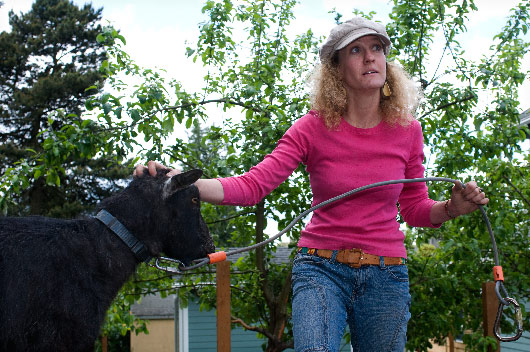Pam Ranson’s Pets, Dogs and Embalmed Ones, Liberty, West Virginia

When I look at my photos from Liberty, I see a pervasive theme of animals ... animals ... animals. They’re rarely absent.
This presence isn’t ‘imposed.’ If animals were absent from the images, it would have taken a conscious effort to exclude them (some images don’t show animals, but animals—either as pets, trophies or artwork—are often present in the room or near the border of the image).
I was never aware, when I lived in the ‘town’, of how much we dominate and are dominated by the animals around (and possibly within) us. It’s kind of driving me crazy, trying to figure out why they’re everywhere. The Innumerable Ones.
I ran across the following quote in a book titled The Ongoing Moment, by Geoff Dyer. I think it’s the most beautiful thing I’ve ever read. The original source is an essay (translated by Eliot Weinberger, who is fabulous) by Jorge Luis Borges, referring to a “certain Chinese encyclopedia.”
“[A]nimals are divided into (a) those that belong to the emperor; (b) embalmed ones; (c) those that are trained; (d) suckling pigs; (e) mermaids; (f) fabulous ones; (g) stray dogs; (h) those that are included in this classification; (i) those that tremble as if they were mad; (j) innumerable ones; (k) those drawn with a very-fine camel’s hair brush; (l) et cetera; (m) those that have just broken the flower vase; (n) those that at a distance resemble flies.”
Devastating. Beautifully devastating. I’m reluctant to say why—because I could only do so by listing a series of reasons ... which are categories of judgments and perceptions. I’m reluctant for now. I’m thinking about it.
But I will cite a quote about the passage, by philosopher Michel Foucault (from The Order of Things):
This book [Foucault’s book] first arose out of a passage in Borges, out of the laughter that shattered, as I read the passage, all the familiar landmarks of thought—our thought, the thought that bears the stamp of our age and our geography—breaking up all the ordered surfaces and all the planes with which we are accustomed to tame the wild profusion of existing things and continuing long afterward to disturb and threaten with collapse our age-old definitions between the Same and the Other.
Borges said the list was called (by its Chinese author) the Celestial Emporium of Benevolent Knowledge’s Taxonomy. Whether the Emporium truly exists is a matter of speculation; he fictionalized some of his sources and source material, and that might be true for the passage. As Wikipedia notes, “Borges’ works often feature many pseudo-learned references resulting in a mix of facts and fiction. To date, no evidence for the existence of such a list has been found.”
If it’s fictional, it’s no less beautiful. Maybe it’s more beautiful; the inventiveness, and what it does to demolish standard forms of classification, is astonishing. Just yesterday, Popular Science magazine posted a story saying that British Biologists Announce Discovery of an Entirely New Branch of Life. The ‘branch’ has been around as long as we have (by we, I mean those who hang metaphorical branches on metaphorical trees, and assign them the value of ‘new knowledge’). Why didn’t we see this ‘new’ form of life before? Because the category didn’t exist. Because it wasn’t a form; it was just life.
Which raises interesting ontological and metaphysical questions (if you’re the kind that likes to partition thought itself). Questions that are political. That are social. And sometimes lethal. Would we be happier if we divided less, and joined more? If we blurred the boundaries? If we were more inclined to call the people and animals around us ... us?.
I think that the people of Liberty unconsciously try to include the category of animals as part of themselves. It’s just that they prefer them embalmed.
 A couple of days ago I was working with Katie Braun (activist/pilot instructor/sailor), who created the Glisan Community Garden (raspberries/blueberries/dirt) in northeast Portland. She noted that she’d recently snipped off the goatees of the two goats she’s been using to rid the place of weeds and ivy, getting ready for planting. The garden faces the main entrance of Multnomah University, a Christian bible college (Braun is a graduate).
A couple of days ago I was working with Katie Braun (activist/pilot instructor/sailor), who created the Glisan Community Garden (raspberries/blueberries/dirt) in northeast Portland. She noted that she’d recently snipped off the goatees of the two goats she’s been using to rid the place of weeds and ivy, getting ready for planting. The garden faces the main entrance of Multnomah University, a Christian bible college (Braun is a graduate).
Students on campus can see across to the garden, where the beardless Ebony and Ivory munch their way to paradise, eating everything in sight. See pitchforks and cloven hooves. “After I cut their beards off, the people across the street thought they were sheep,” Braun said. “But then they think a lot about flocks and shepherds.”
And so ... I’ll finish with a poem,The Panther, by Rainer Maria Rilke:
From seeing the bars, his seeing is so exhausted
that it no longer holds anything anymore.
To him the world is bars, a hundred thousand
bars, and behind bars, nothing.
The lithe swinging of that rhythmical easy stride
which circles down to the tiniest hub
is like a dance of energy around a point
in which a great will stands stunned and numb.
Only at times the curtains of the pupil rise
without a sound ... then a shape enters,
slips through the tightened space of the shoulders,
reaches the heart, and dies.
[Quoted from Selected Poems of Rainer Maria Rilke: A Translation from the German and Commentary by Robert Bly (Harper & Row: New York, 1981). The Panther, as well as the book as a whole, is downloadable as an E-book from Bookshare, a nonprofit that has a copyright exemption for people who are visually impaired.]